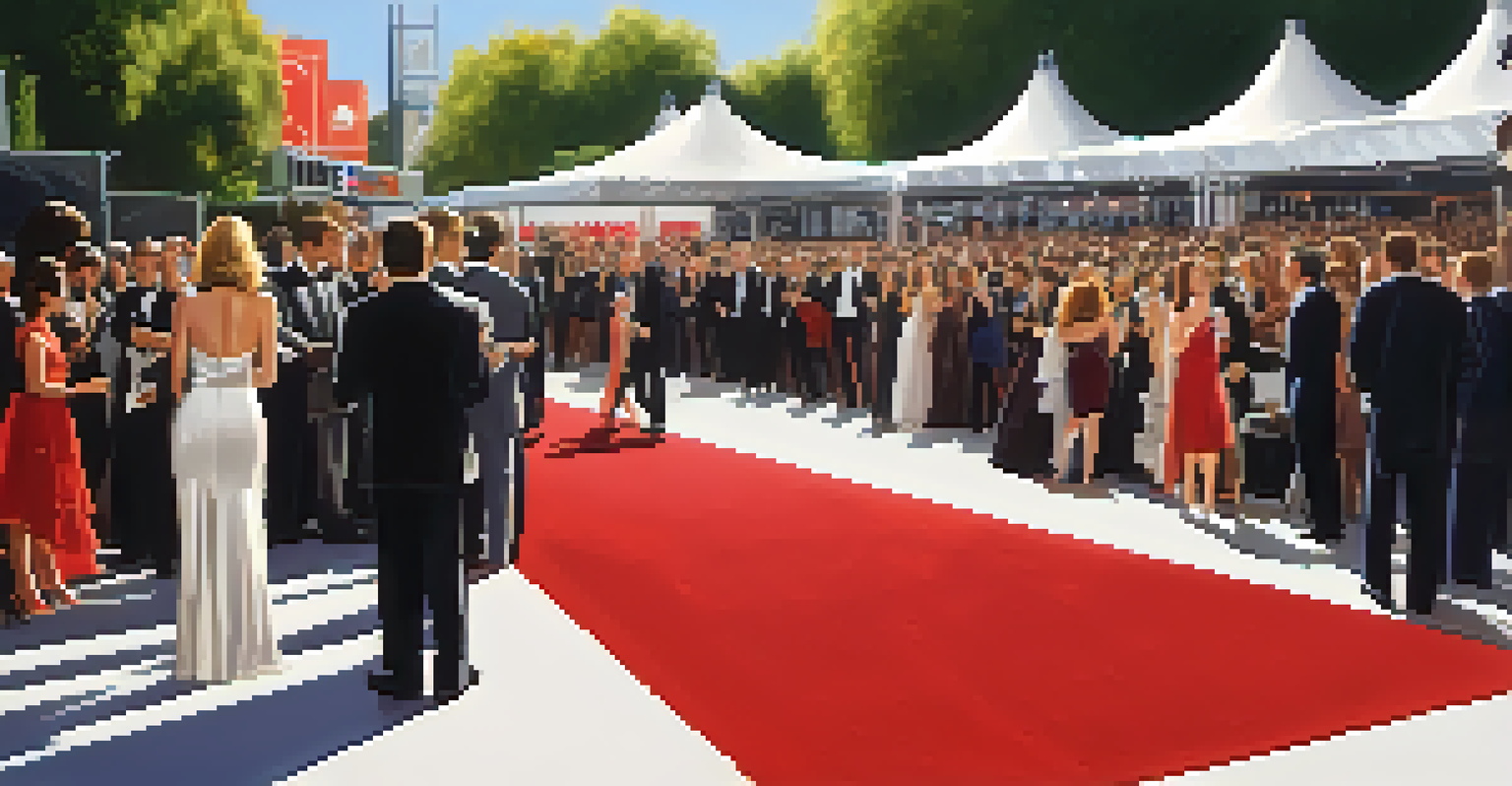Exploring the Power Dynamics in Talent Agencies in Hollywood

Understanding the Role of Talent Agencies in Hollywood
Talent agencies serve as the bridge between artists and the entertainment industry, representing actors, writers, and directors. They negotiate contracts, secure auditions, and help shape careers, making them vital players in Hollywood. Understanding how these agencies operate is key to comprehending the power dynamics at play within the film and television landscape.
Talent agencies are the gatekeepers of opportunities, shaping the very fabric of the entertainment world.
These agencies are not just about representation; they also wield significant influence over the types of projects that get greenlit. The relationships talent agents cultivate with producers and studio executives can determine which scripts see the light of day. This interconnected web of influence showcases the power agents hold beyond mere contract negotiations.
Ultimately, talent agencies are crucial in navigating the complexities of Hollywood, where creativity meets commerce. Their role extends beyond advocating for their clients; they are gatekeepers of opportunities, shaping the very fabric of the entertainment world.
The Hierarchical Structure Within Talent Agencies
Talent agencies often operate with a clear hierarchy, typically beginning with entry-level assistants and climbing to agents and partners. This structure can create a culture of competition and ambition, where junior agents aspire to climb the ranks. Understanding this hierarchy is essential to grasping how power is distributed within these organizations.

At the top, senior agents and partners wield considerable influence, not just over their clients but also within the agency itself. Their decisions can affect which new talent gets signed and how existing clients are managed. This power dynamic can lead to a strong sense of loyalty among junior staff, who seek mentorship and guidance from those more established.
Agencies as Gatekeepers in Hollywood
Talent agencies play a crucial role in shaping the projects that get produced and the careers of artists.
However, this hierarchy can also lead to tension, especially when the ambitions of junior agents clash with the interests of senior partners. Navigating these relationships requires a delicate balance of respect and assertiveness, illustrating how power dynamics can affect workplace culture within talent agencies.
The Influence of Major Players in the Industry
In Hollywood, certain talent agencies have become synonymous with power, often dominating the market. Agencies like CAA and WME have not only extensive rosters of high-profile clients but also connections that can open doors for new projects. This influence can shape industry trends, making it essential to consider the role of these major players in understanding power dynamics.
In a world where celebrity often dictates agency power, balancing the needs of established stars and emerging talent is crucial for long-term success.
When a prominent agent from a leading agency takes on a project, it can attract significant attention and investment. This phenomenon exemplifies how the reputations of agents and their agencies can impact the success of films and shows. As such, these agencies can act as trendsetters within the entertainment industry.
Additionally, the competition between these major agencies can lead to strategic moves, such as mergers or innovative marketing approaches. These dynamics are crucial to understanding how power shifts and evolves within Hollywood, illustrating the ongoing dance of influence among talent agencies.
Shifting Power Dynamics with New Media
The rise of digital platforms has dramatically altered the landscape of talent representation, shifting power dynamics in agencies. With the emergence of streaming services and online content creators, traditional agencies are adapting to new models of engagement. This evolution highlights how power is not static but rather fluid, responding to changes in technology and audience consumption.
As independent creators gain traction through platforms like YouTube and TikTok, they often bypass traditional agency structures. This shift empowers artists to negotiate their terms, sometimes rendering traditional representation less relevant. Consequently, talent agencies must rethink their strategies to remain competitive and relevant in this new digital age.
Power Shifts with New Media
The rise of digital platforms empowers independent creators, prompting traditional agencies to adapt their strategies.
These changes compel talent agencies to diversify their offerings and adopt more flexible approaches to representation. The challenge lies in balancing the traditional roles of agent and manager with the demands of a rapidly changing industry. This adaptability is essential for agencies to maintain their influence in a world where power dynamics are continuously in flux.
The Role of Diversity and Inclusion in Power Structures
Diversity and inclusion have become significant talking points within Hollywood, influencing the power dynamics of talent agencies. As the industry recognizes the importance of varied perspectives, agencies are increasingly held accountable for their representation practices. This shift is reshaping the landscape and prompting agencies to rethink their approaches to talent recruitment and representation.
Agencies that prioritize diversity often find that it enhances their creativity and marketability, allowing them to connect with broader audiences. By embracing diverse talent, they not only fulfill social responsibilities but also tap into new narratives that resonate with viewers. This trend reflects a growing understanding that diverse voices contribute to richer storytelling in film and television.
However, the journey towards genuine diversity is fraught with challenges. Agencies must confront entrenched biases and resist the temptation to tokenize underrepresented talent. Navigating this complex landscape requires a commitment to fostering an inclusive environment where all voices can thrive, ultimately reshaping the power dynamics within the industry.
The Impact of Celebrity Status on Agency Power
In Hollywood, celebrity status can significantly skew the power dynamics within talent agencies. High-profile clients often command more attention and resources, which can lead to disparities in how agents prioritize their responsibilities. This phenomenon raises questions about equity and fairness in representation, as some clients may receive preferential treatment based on their fame.
When a client achieves significant success, their agent's reputation can also soar, further amplifying the influence of that agent within the agency. This reciprocal relationship underscores how celebrity status can enhance an agent’s power, impacting the agency's overall standing within the industry. As a result, the dynamics of power become intertwined with the visibility and success of individual clients.
Diversity is Reshaping Agencies
A focus on diversity and inclusion is transforming talent agencies, enhancing creativity and marketability while addressing industry biases.
However, this focus on high-profile talent can also create challenges for agencies in nurturing emerging artists. Striking a balance between catering to established stars and developing new talent is crucial for long-term success. Understanding these dynamics helps illuminate the complexities of representation in an industry where celebrity often dictates agency power.
Future Trends in Talent Agency Power Dynamics
As the entertainment landscape evolves, talent agencies must adapt to emerging trends that will shape their power dynamics. From the continued growth of digital content to the increasing importance of global markets, these shifts present both challenges and opportunities. Agencies that remain agile and forward-thinking will be better positioned to navigate this changing environment.
The ongoing push for representation and inclusivity will likely continue to influence agency practices. As audiences demand more diverse stories, agencies that embrace this shift will not only enhance their relevance but also attract talent that aligns with these values. This trend signals a potential rebalancing of power dynamics, favoring those willing to adapt to industry demands.

Moreover, the rise of technology and data analytics in talent representation is likely to transform how agencies operate. By leveraging data to identify trends and preferences, agencies can make more informed decisions about talent and projects. This analytical approach can enhance their influence in a competitive landscape, illustrating how future trends will shape the ongoing evolution of power dynamics in Hollywood.